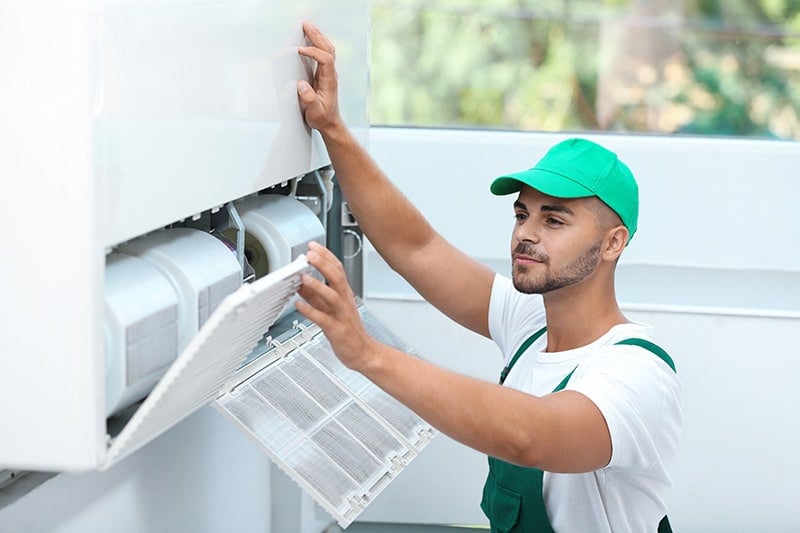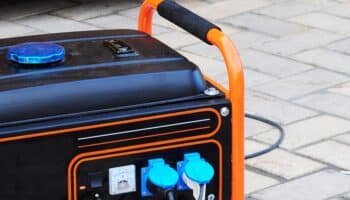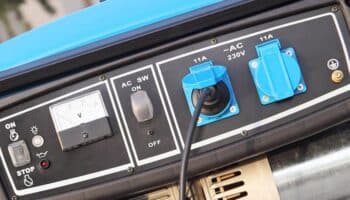Are you having a hard time comparing natural gas vs propane generators?
Don’t worry, you’re not alone. In fact, thousands of people find themselves in the same situation when looking for a new generator.
Both propane and natural gas are clean-emission fuel sources that can be used to power up your generators, but what are their differences?
Natural gas generators have a steady supply that doesn’t require refilling, whereas propane generators are cheaper and great if you’re going on a camping trip. When making a decision, you should also take into account the longevity, energy, startup, noise, and maintenance.

Keep reading to make the right choice!
Comparing Propane vs Gas Generators
When it comes to two nearly identical appliances, it’s important to look at the specifics to understand the main differences between them and the advantages that each one has. To make it simpler, I’ve picked 8 critical categories to consider.
#1 Availability
Natural gas is more readily available as it comes from the gas line in your home. On the other hand, you have to refill your propane tank from the nearest gas station. This can be a little burdensome, especially if the nearest gas station isn’t really near.
So natural gas is the way to go if you’re concerned about availability. But if you’re using a cylinder for natural gas too, then it won’t be the best option.
#2 Longevity
If you don’t intend to use the generator too often, it’ll be lying idle for the better part of the year. In that case, you need a fuel source that doesn’t lose its effectiveness or quality when not in use for long periods.
If you have a natural gas generator with the supply coming from the direct line, you can simply turn it on whenever you need to power up your generator.
You can also keep a propane generator for a long time without using it since liquid propane doesn’t lose its quality over time. When comparing both fuel sources based on longevity, it’s more or less a tie.
#3 Startup
If your generator is going to be lying idle for the most part, you may have to choose your fuel source carefully.
Most generators that are powered by gasoline or diesel tend to get choked up and have difficulty starting. Even natural gas generators take a lot of effort to start up, especially in cold weather.
On the other hand, propane gas generators easily start in any condition, regardless of the weather or how long it has been sitting idle. This makes it one of the most suitable fuel sources for standby generators and for cold conditions.
#4 Operating Noise
When you turn on a generator, you’re actually powering up an engine! So there’s going to be noise, whether you like it or not (mostly not).
Some generators are less noisy than others, though. Propane generators are much quieter than natural gas generators.
#5 Maintenance
You don’t want to become a part-time technician, do you? So consider the level of maintenance you’ll have to put up with.
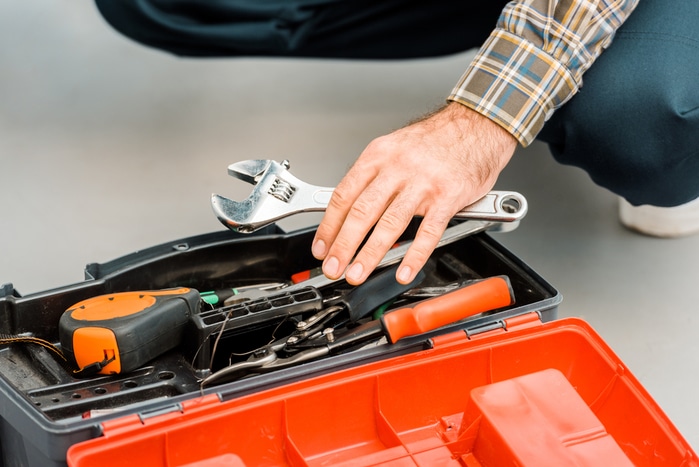
Since generators have an engine, they certainly require periodic maintenance. However, owners of propane generators have little to worry about. That’s because propane ones don’t leave any residue or buildup inside the fuel lines or generator components.
Natural gas generators are also low maintenance. But they do require the occasional servicing.
#6 Energy
When comparing energy between propane and natural gas, remember that the former expels twice as much energy per cubic foot as the latter.
Propane burns at 2,490 BTUs per cubic foot, whereas natural gas only lets out 1,040 BTUs per cubic foot. This means that in a span of 1 minute, less propane is consumed.
However, this doesn’t mean that propane would be cheaper than natural gas. We’ll cover that later.
#7 Cost
Instead of focusing on the cost of propane and natural gas, I’ll talk about the cost-effectiveness of each.
As we know already, propane generators are powered by a propane tank that needs to be refilled from time to time.
If you have a larger tank, you’ll have to pay up a larger amount every time you top it up. Even then, propane generators are much cheaper than gas generators.
#8 Usage
Last but not least, the purpose and location where you’re using the generator also come into play when comparing natural gas vs propane generators.
Normally, most households use natural gas generators because of the readily available natural gas supply.
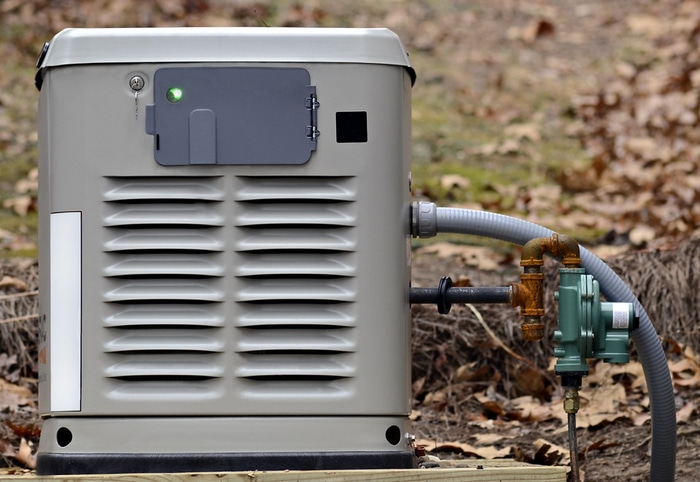
This reason also makes natural gas generators suitable for hospitals, offices, schools, and many other public places and important institutions that can’t afford to have a power outage.
On the other hand, propane generators are more used for camping trips, picnics, and hunting trips. Basically, any event that has to do with the outdoors.
You can easily carry a small propane generator with its tank inside your RV or caravan, and you can power it up whenever you need to.
Can You Use Natural Gas in a Propane Generator?
Simply put, a generator that’s built to run on propane gas won’t be suitable for use with natural gas. You may have seen many videos and articles that show you how to do it.
Let me warn you that it can be extremely dangerous if you try something like this without consulting your technician first!
It can happen. There’s a sudden power outage, and you don’t have any propane left in your tank, and you can’t go out to get it refilled. You’re tempted to look for a workaround that allows you to convert your propane generator to run on natural gas.
Technically, yes, there is a way to convert it. Conversion kits are also available that you can buy and use to make it a dual-fuel generator. But this is also not entirely safe.
Plus, there can be a lot of performance issues that arise from using different kinds of fuel sources.
Propane has twice as much energy as natural gas. So when your generator runs on gas, it will start to sputter and run at much less horsepower. This can also damage any appliances you’re running on the generator.
Really think you’d need more than one fuel source for your generator in case of an emergency? I suggest you go for a dual-fuel or tri-fuel generator instead of modifying your existing propane generator.
How Long Will a Generator Run on a 20lb Tank of Propane?
The amount of time your generator will run on a 20lb (ca. 9 kg) tank of propane doesn’t just depend on the volume of fuel that you have. Other factors such as the horsepower of the generator and the load applied to it also come into play.
Let’s assume that we have a 10-horsepower generator that typically operates at 50% load, which means it runs at 5hp. Now, 1 horsepower produces 500 watts of energy per hour under load, so 5hp generates 2,500 watts.
Since each horsepower consumes 10,000 BTUs per hour, your generator will be burning 50,000 BTUs every hour.
Also, propane contains 92,000 BTUs per gallon. Considering that your propane generator has a 20# cylinder and a gallon capacity of 4.8, the total BTU capacity comes up to 441,600 BTUs.
Since your generator consumes 50,000 BTUs per hour, dividing the total BTU capacity by this figure gives us 8.8 hours. If the load on the generator is increased, the figure goes down. However, if the generator’s horsepower is greater and the load remains the same, the time will also increase.
What is a Propane Generator?
A propane generator runs on, well, propane. Propane is a form of liquified petroleum gas (LPG). And it’s one of the most common fuel sources that people use to power up their generators. It’s obtained from a process of natural gas processing and petroleum refining.
It requires a separate propane tank that’s connected to the generator with a pipe. When the tank runs out of fuel, you can disconnect it from the generator. And then just get it refilled from the nearest gas station or LPG provider.
What is a Gas Generator?
A gas generator is powered by natural gas, supplied by the direct line installed in your house or through a gas tank. It consists of methane and a few other gases.
Natural gas is another popular source for fueling generators because it’s more readily available inside homes, offices, hospitals, etc.
These generators come in various sizes and power ratings, and you can choose depending on your energy requirements.
Recapping
To summarize all the information provided, I always find it easier to understand everything with a small table that includes what was discussed.
Here are the key takeaways:
| Generator Type | Pros | Cons |
| Propane | -Easier to start after long idle periods. -Quieter. -Much more efficient than natural gas. -Little servicing required. -Burns cleaner. | -Not readily and steadily available in most homes. |
| Natural Gas | -Readily and steadily available in most homes. | -Requires more servicing than propane. -Less heat-efficient than propane. -Might struggle to start after long idle periods. |
Conclusion
That about covers it! I hope that this article has helped you decide between a natural gas and a propane generator.
If you take anything away, remember that natural gas has a more steady supply and doesn’t require any upfront cost or refilling. Propane, on the other hand, has more energy and is suitable for powering up generators that run once in a while.
Keep the factors I talked about in mind, and you’ll make the right choice.
Found this post helpful? Want to learn more about similar topics? Feel free to check out similar articles on our site.
Thank you for reading, and have an amazing day!
— Craig.
Frequently Asked Questions
What’s the Average Price per Gallon of Both Fuels?
This varies from month to month, but at the time of writing of this FAQs section, the average gallon of natural gas in the U.S. is priced at $2.19, whereas propane goes for about $2.67.
As stated above, propane is more expensive, but it also produces more than 230% more heat than natural gas for the same amount of gallons. In fact, the price per propane gallon would have to reach +$5 to argue that natural gas is preferable considering costs alone.
Is Natural Gas Safer Than Propane?
To a degree, yes.
As opposed to natural gas, propane is heavier than air. This means that when released, it plummets to the ground rather than dissipating into the environment, which creates a higher explosion risk.
This is why you must always follow safety recommendations when working with any type of flammable substance.
What Capacity Propane Generator Should I Buy?
The answer to that question depends on what you want to use it for.
If you want to be covered for “short” power outages ranging from 1 to 2 days, a 120-gallon tank should be enough. However, if you need to have your generator working for a longer period (say, 8 days), you’ll want to get a unit 500-gallon tank or bigger.

